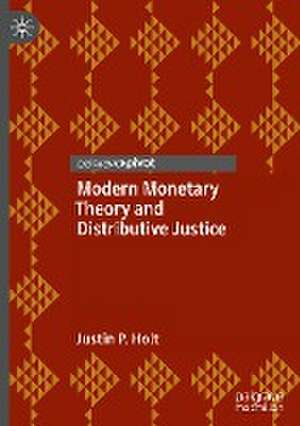Modern Monetary Theory and Distributive Justice
Autor Justin P. Holten Limba Engleză Hardback – 14 oct 2023
Preț: 316.16 lei
Nou
Puncte Express: 474
Preț estimativ în valută:
60.50€ • 63.16$ • 50.07£
60.50€ • 63.16$ • 50.07£
Carte tipărită la comandă
Livrare economică 04-18 aprilie
Preluare comenzi: 021 569.72.76
Specificații
ISBN-13: 9783031433030
ISBN-10: 3031433033
Ilustrații: V, 104 p.
Dimensiuni: 148 x 210 mm
Greutate: 0.29 kg
Ediția:1st ed. 2023
Editura: Springer International Publishing
Colecția Palgrave Macmillan
Locul publicării:Cham, Switzerland
ISBN-10: 3031433033
Ilustrații: V, 104 p.
Dimensiuni: 148 x 210 mm
Greutate: 0.29 kg
Ediția:1st ed. 2023
Editura: Springer International Publishing
Colecția Palgrave Macmillan
Locul publicării:Cham, Switzerland
Cuprins
1: Introduction: New Views for Distributive Justice: Money, Demand, and Full Employment.- 2: What is Distributive Justice?- 3: What is Modern Money Theory?- 4: What Insights can Modern Money Theory Provide to Distributive Justice?- 5: What Are the Useful Limits of Modern Money Theory for Distributive Justice?- 6: Conclusion.
Notă biografică
Justin P. Holt taught political philosophy at New York University, Eugene Lang College, The City University of New York, and Wright College. He completed his Ph.D. in philosophy at the New School for Social Research. Holt has published several articles and books on political philosophy, sociology, distributive justice, economics, just economic regimes, G.A. Cohen, and John Rawls. Currently, he works as an economist at the U.S. Bureau of Labor Statistics.
Textul de pe ultima copertă
Modern Monetary Theory and Distributive Justice shows how the macroeconomic framework called modern money theory (MMT) is relevant to the field of political philosophy called distributive justice. Many of the macroeconomic assumptions of distributive justice are unstated and unexamined. The framework of MMT illuminates these assumptions and provides an alternative vision of distributive justice analysis and prescriptions. In particular, MMT holds that modern money is a nominal state issued token (fiat), there is a distinction between nominal assets and real assets, that state money as a nominal token can cause changes in real terms, and that the macroeconomy has historically not operated at capacity. The upshot of these assumptions held by MMT is that state spending can bring about changes in persons’ well-being without traditional redistributive measures via taxation. This is in contradistinction to standard assumptions in the distributive justice literature, whichholds that the macroeconomy is at capacity and, thus, redistribution is the necessary mechanism for enacting improvements in well-being. This is a fundamental shift in how distributive justice can be conceived.
Caracteristici
Provides an introduction to modern money theory Argues that state spending can improve persons’ well-being without redistribution via taxation Uses modern money theory to re-frame traditional distributive justice approaches to macroeconomics
